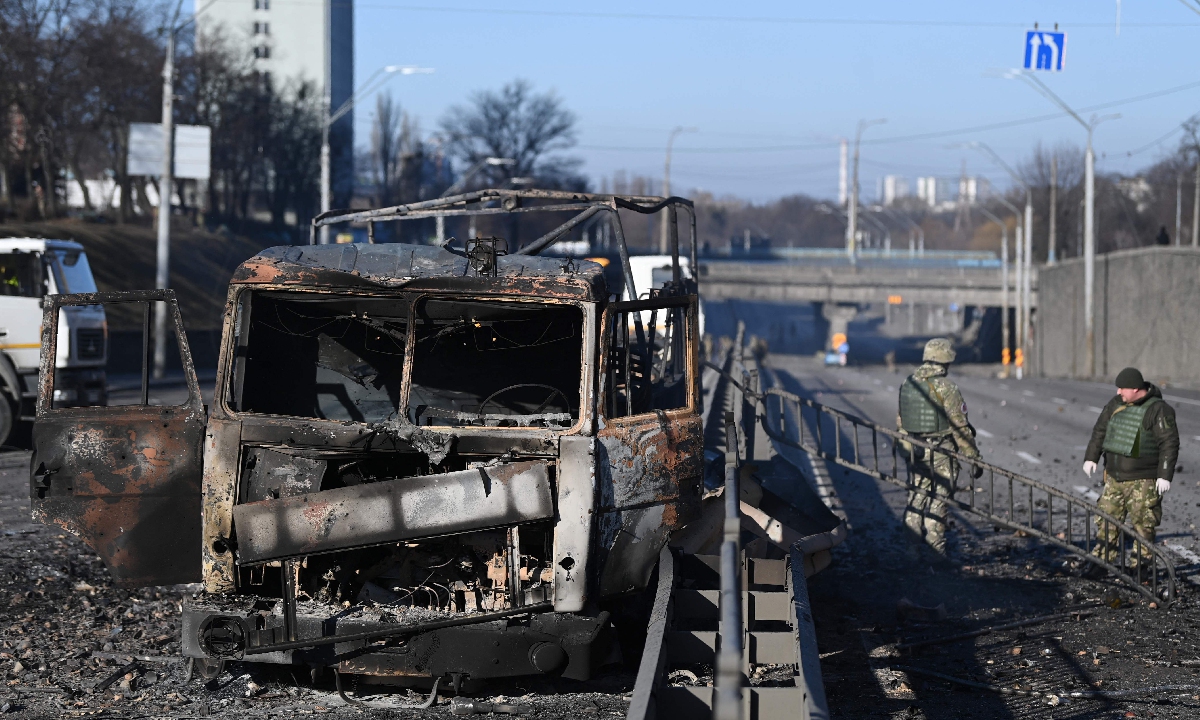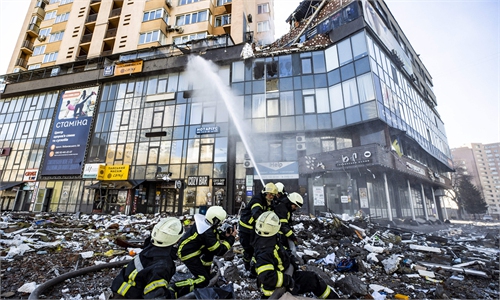
Ukrainian soldiers stand next to a burnt Ukrainian army vehicle on the west side of the capital Kyiv on February 26, 2022. Ukraine and Russia are set to hold negotiations at the Belarusian-Ukrainian border. Photo: AFP
Click here to stay tuned with our live updates on Ukraine tensions.
Although the US and some other Western countries are trying to handle the current situation in Ukraine with waves of sanctions against Russia and questioning Beijing's neutral stance, China has once again clarified its neutrality and the reason to the EU, France, Germany and the UK as to why it opposes sanctions ahead of the UN Emergency Special Session on Sunday.
Chinese State Councilor and Foreign Minister Wang Yi had phone conversations with UK Foreign Secretary Elizabeth Truss, High Representative of the EU for Foreign Affairs Josep Borrell, French Diplomatic Advisor to the President Emmanuel Bonne and German Foreign Minister Annalena Baerbock from Friday to Saturday, according to the website of the Ministry of Foreign Affairs on Sunday.
They had in-depth exchanges of views with a focus on the situation in Ukraine, while Wang expounded China's basic position on the Ukraine issue. Wang stressed that "China supports and encourages all diplomatic efforts conducive to a peaceful settlement of the Ukraine crisis. China welcomes the earliest possible direct dialogue and negotiation between Russia and Ukraine."
Ukraine's delegation is now heading to Gomel in Belarus for negotiations with Russia, Russian media Sputnik reported on Sunday. This announcement comes just minutes after the deadline previously set by the Russian delegation for the negotiations with Ukraine expired. According to a member of the Russian delegation, Leonid Slutsky, Russia will demonstrate quite a "hardline" approach at the upcoming talks with Ukraine.
Russian President Vladimir Putin and Israeli Prime Minister Naftali Bennett had a phone call on Sunday in which Putin gave assurances that Moscow remains open to talks with Kiev, but informed Bennett that Ukraine's leaders have shown "inconsistency" on the matter.
Chinese military experts said Russia has been restrained in using force to attack the Ukrainian army because most Russian forces are being deployed to prevent NATO intervention, but Russia does not want the conflict to last long, so it might change strategy depending on how the situation develops.
Putin ordered the military to put the nation's nuclear deterrence forces on high alert Sunday following "aggressive statements" from NATO, Sputnik reported.
The US doesn't want to see the conflict end quickly as it wants Russia to be mired in trouble as long as possible, so the talks won't be easy, and what happens in the battlefield will decide the result of the negotiations, experts said.
When the conflict broke out, most Western countries were shocked, and only showed support by "praying for Ukraine" and announced sanctions, but did not dare to provide weapons to Ukraine or send reinforcements.
The situation has somehow changed over the weekend, as Ukrainian forces were not as weak as the West previously thought, and the conflict is likely to continue. Some Western countries have started supplying arms to Ukraine, because they have seen the possibility of further escalating and extending the conflict to leave Russia mired in the mud of Ukraine, said analysts.
This is actually bad for negotiations, as the longer the conflict continues, the more casualties there will be, and the West wants to maximize the losses for both Russia and Ukraine rather than minimize the damage, said Chinese experts. China's stance of neutrality is important because if there is one country that can one day effectively mediate the conflict, that country should be one with real neutrality and which respects Ukraine's sovereignty and also did not follow the West in sanctioning Russia and harming the livelihood of Russian people.
What's real neutrality?
Western voices should not be allowed to dominate the voice of the international community over the Ukraine situation, as Western powers, especially the US and NATO, have actually been the key forces in instigating the crisis and contradiction between Russia and Ukraine. In other words, the West is now deliberately taking sides, said analysts.
Chinese Foreign Minister Wang said, "China maintains that the sovereignty and territorial integrity of all countries should be respected and protected and the purposes and principles of the UN Charter should be earnestly observed. This position of China is consistent and clear-cut, and applies equally to the Ukraine issue."
But he also said, "The legitimate security concerns of all countries should be respected. Given NATO's five consecutive rounds of eastward expansion, Russia's legitimate security demands ought to be taken seriously and properly addressed."
Cui Hongjian, director of the Department of European Studies at the China Institute of International Studies, told the Global Times on Sunday that the US and NATO are actually part of the cause of this conflict in Ukraine, so if the world lets them dominate public opinion across the international community, it would be unfair and the problem will not be solved.
Yang Jin, an associate research fellow at the Institute of Russian, Eastern European, and Central Asian Studies under the Chinese Academy of Social Sciences, said that Russia won't be intimidated by sanctions, and if sanctions were effective, then the conflict would have been prevented long ago.
The reason why China believes Russia does have "legitimate security concerns" is that "we have seen how NATO acted to pressure Russia and destroyed the former Yugoslavia in the past. If there hadn't been these concrete security pressures and NATO military deployments around Russian territory, Moscow would not have needed to carry out such risky military operations to respond to NATO's threat," Yang said.
Wang said to senior European diplomats that "Actions taken by the UN Security Council should help ease the situation and facilitate a diplomatic resolution rather than fuelling tensions and causing further escalation. In view of this, China has always disapproved of willfully invoking UN Charter Chapter VII, which authorizes the use of force and sanctions in UNSC resolutions."
Sanctioning or condemning Russia, just as the West has done, is actually much easier than staying neutral and responsible in order to contribute to conflict mediation while being questioned and pressured by the West, said a Beijing-based expert on international relations. He added that "China is a responsible major power with independent diplomacy and clear stance based on objective and fair judgment of the situation, rather than a country with no independent thought that just blindly follows the West on every issue."
The 2022 Winter Paralympics will be held in Beijing from March 4 to 13, and China could use it as a chance to play a bigger role for peace mediation and make the Olympics a platform to realize peace, said some Chinese experts.
Sustainable security mechanism
"The Ukraine issue has evolved in a complex historical context. Ukraine should function as a bridge between the East and the West, not as a frontier in big power confrontation. China also supports the EU and Russia in entering into an equal-footed dialogue on European security issues and implementing the philosophy of indivisible security, so as to eventually form a balanced, effective and sustainable European security mechanism," the Chinese foreign minister said.
Cui said that for Europe to establish a balanced, effective and sustainable security mechanism, the security concerns of all parties should be resolved in an equal way. "This is the precondition."
Europe needs to stop engaging in a collective security mechanism that excludes Russia, and even targets Russia. "If NATO cannot accept Russia, then obviously one of NATO's purposes is to target Russia, and then the problem of European security will never be solved," Cui said.
Europe should also try to avoid interference from external powers, especially the US, said the experts. Key EU members such as France and Germany always have divergences with the US not only on issues related to Russia, but also on the Iran nuclear deal, ties with China and Middle East affairs. Unfortunately, however, the US and US-led NATO dominate security issues in Europe, making it hard for the continent to reach mutual trust and respect with Russia in the past, which has caused today's tragedy, they noted.
"If the Ukraine crisis is mainly handled by Europe, rather than by the US and NATO, maybe peaceful negotiation would already have been realized long before Russia lost patience and launched military operations. At least, it wouldn't be as bad as it is now," Cui said.
But unfortunately, the US and the US-led NATO are unlikely to let this happen, as they need Russia to play the enemy to keep trans-Atlantic ties solid, and unfortunately, the current conflict in Ukraine has boosted this trend, so it will be hard for Europe to completely act independently to build a new security mechanism with Russia in the future, Yang said.


